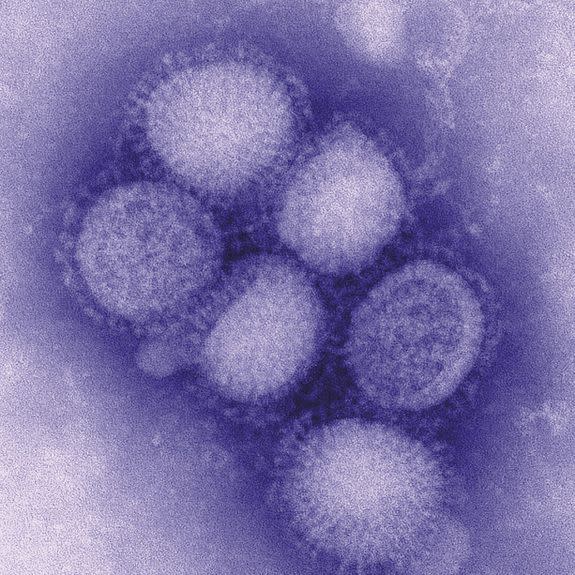The coming Arctic blast probably won't make you sick, but winter definitely can

The coldest air of the season will soon smack the Midwest and East Coast, dramatically dropping temperatures and rudely establishing that winter is here. The Arctic chill will arrive between Dec. 8 and 11, and could persist in some areas straight through Christmas.
Given such an abrupt shift in weather, especially since the fall was much milder-than-average across the country, one might think that it's going to be easier to get sick as soon as the cold air hits. Many people think that they're more susceptible to the common cold or the flu during periods of shifting weather conditions.
However, experts say this is probably not the case — or at least, it's difficult to prove.
SEE ALSO: Fans of cold and snow in the U.S. will love this new winter outlook
"I don’t think there is data to answer that question definitively," said Larry Kociolek, a specialist in pediatric infectious diseases at Ann & Robert H. Lurie Children’s Hospital of Chicago, in an interview.
Weather is notoriously fickle from week to week, so it's challenging for researchers to identify how specific shifts in weather might increase the risk of catching an illness. "It difficult to tease that out," said Kociolek, who is also the hospital's epidemiologist.
But, there is evidence that winter weather, and the long winter season itself, can make it easier to catch either a common cold or the flu. There's not one reason why, but rather a mix of factors.

Image: cdc
"I think it’s a combo of increased transmission with people hanging out more, the fact that these viruses are more common in winter, and that there is some biological evidence [some viruses] are more infectious during the wintertime,” Kociolek explained.
It's true that we all tend to congregate more inside during the winter holidays, for instance, making it easier to pick up a respiratory virus. But these viruses also tend to occur in greater abundance during the colder seasons.
"Several viruses are more common in late fall and early winter and will continue to increase throughout the winter time," Kociolek said. "Many of these viruses will disappear from the community by the time spring rolls around."
Cold-causing viruses also reproduce better in the chillier air.
"The rhinoviruses that are the most common cause of colds in humans have been demonstrated to replicate better in a cooler climate," said Kociolek. Research, like a 2013 study published in the journal Nature, support the hypothesis that rhinoviruses can reproduce and flourish inside people's winter-chilled upper respiratory tracts.
But it's not just cold viruses that can be more infectious during the winter. The notorious influenza virus also becomes more threatening during winter, specifically because the air is significantly drier (in contrast to a humid summer) during this period.
Latest ECMWF weekly pushing the coldest airmass of season across the Northeast during mid-December. For once, I'm hopeful for a #WhiteChristmas in the Northeast! 🙏 pic.twitter.com/nizUhUMK1N
— Michael Ventrice (@MJVentrice) December 1, 2017
"The weather conditions and amount of moisture in the air does influence the start of the flu season," said Chris Uejio, assistant professor in the public health program at Florida State University, in an interview.
"In this case it’s colder, but very dry air," said Uejio.
Colder air can't carry as much moisture (think the opposite of swampy subtropical New Orleans), so cold and dry conditions go hand and hand. And once the dryness hits, the flu season begins — though not right away.
"About four weeks after [the onset of a cooler and drier air mass] it increases the probability that the influenza season will start," said Uejio, who notes that this research applies to areas in the mid-latitudes — where the U.S. lies — all the way up to polar regions (the tropics are a different story).
So if the upcoming cold wave has staying power, it could mark the beginning of flu season in parts of the U.S.
The drier air allows the flu virus to live outside a body — perhaps on a subway handrail or someone's hand — for a longer amount of time.
"It could be a change from less than a minute to multiple minutes," explained Uejio. "The assumption is that if the virus survives longer there, it will give you a greater opportunity to infect yourself."
Latest #FluView report shows #flu activity is increasing in the U.S.: https://t.co/QifYwqPJiR pic.twitter.com/W6iBW8cFmD
— CDC Flu (@CDCFlu) November 30, 2017
But, beyond cooler and drier air increasing the survival of the influenza virus, Uejio says there's no compelling evidence showing that any abrupt onset of winter weather can increase the likelihood of catching the flu.
"It's largely the lack of moisture in the air. That’s about as strong a statement as one can make about the timing of the seasons," he says.
He makes an important caveat about the relationship between flu and winter, however. Influenza may be alive longer outside our bodies during winter, but Uejio emphasizes that, "The ambient weather conditions and how dry it is do not show a relationship to how many people get sick or die."
Rather, he notes that "flu transmission is more related to the amount of people who are vaccinated and also how infectious the current strain is."
Kociolek, the pediatrician, underscored "the importance of getting a flu vaccine," to decrease the chances of getting infected — and spreading that infection. "It's particularly important this time of year."
So if you do get a cold or flu this winter season — and you're vaccinated — it's unlikely that any sharp chill nipped you. It's probably just the cool, tedious pace of winter itself.
Science editor Andrew Freedman contributed to this story.
WATCH: You're not alone—sleep paralysis affects a lot of people


